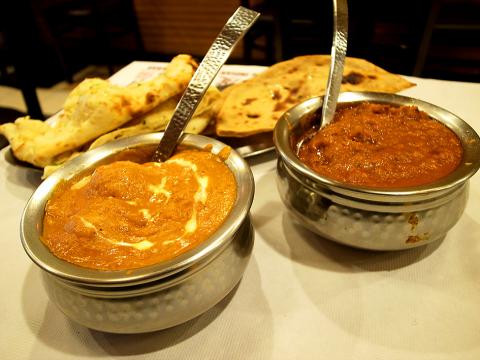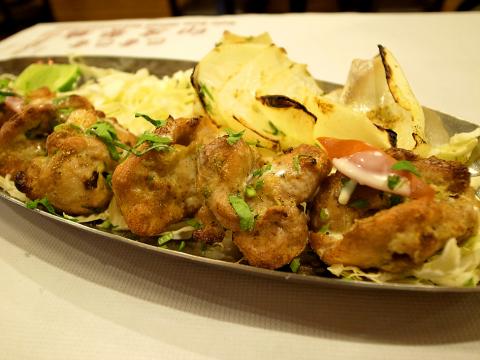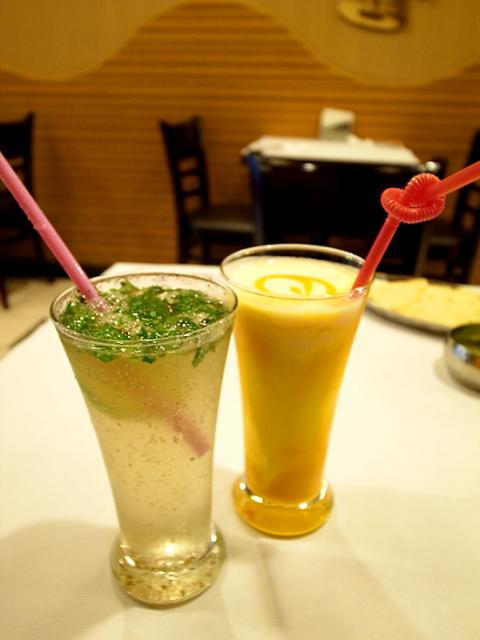Finding a really good Indian restaurant can be a difficult task in Taipei, where choices are limited not so much because of the small number of dining spots, but because of the similar, if not exactly identical, food on offer. Fortunately, progress is occasionally made with the arrival of establishments such as the Balle Balle Indian Restaurant & Bar.
Opened more than one year ago on Guangfu North Road (光復北路) near Bade Road (八德路), the place first caught my attention when I walked past the storefront and saw it was packed with patrons many of whom were Indian. And the reason for its brisk business proves to be self-evident as soon as I took my first bite of the rich flavors from the Indian subcontinent finely rendered at Balle Balle.
Balle Balle’s kitchen is fully devoted to Punjabi cuisine from the Punjab region in north India. As it turns out, many of the popular elements of the Indian cuisine such as tandoori cooking is derived from the region. Compared to the often extensive menus that have the weight of a book at similar establishments, the Punjabi-centered eatery has a diner-friendly carte mainly composed of appetizers, tandoori food, curry dishes and breads. Meanwhile, ingredients used by the restaurant’s team of Indian chefs directly come from the Indian specialty store which is the owner’s other business venture.

Photo: Ho Yi, Taipei Times
As Punjab is also the birthplace of Sikhism, the space is bedecked with ornaments and objects that represent its religious and cultural roots, including a life-size statue of a Sikh greeting diners by the entrance. Apart from the Sikh figurines and dolls, the dining environment is neatly arranged, devoid of gaudy travel photos of South Asian landmarks and exudes a feel of straightforwardness that is strangely comforting.
Equally reassuring is the Indian manager known as GV. Speaking fluently in English and Mandarin, the manager is as friendly as he is helpful in making recommendations and answering patrons’ needs.
With the help of GV, my dining partner and I started our meal with murg malai kebab (NT$380), a tandoori starter made up of boneless chicken marinated with cashew paste, homemade cream and spices. We were both won over by the surprisingly tender, succulent meat, accompanied by the slightly charred, lusciously sweet onions.

Photo: Ho Yi, Taipei Times
The vegetarian alternative to the chicken tandoori snack is paneer tikka, which involves Indian cottage cheese grilled in a clay oven. Among them, hariyali paneer tikka (NT$410) is marinated with yogurt, cashew paste and flavored with mint and spinach.
From the curry section, which comprises choices of chicken, lamb, fish and vegetables, we chose veg kofta (NT$290), featuring soft balls made from mashed potatoes and mixed vegetables and submerged in onion and cashew gravy, while spices including ginger and coriander add punch to the delightfully creamy dish.
The gosht rahra (NT$360) delivered a wow effect with the offering of tender, boneless mutton tossed in onion gravy and makes another mild, smooth curry delicacy.

Photo: Ho Yi, Taipei Times
The restaurant has a wide variety of naan, roti, kulcha and paratha. Both the garlic naan (NT$75) and tandoori roti (NT$85) we tried were satisfyingly substantial and chewy. Amritsari aloo kulcha (NT$120) particularly impressed with the savory stuffing of mashed potatoes and spices.
For drinks, the restaurant offers the richest and thickest mango lassi (NT$120) I have ever tried. But the best companion to Balle Balle’s hearty fare, in my view, is the pudhina nimbu soda (NT$80), that aids digestion with a concoction of mint leaves, lime, black pepper and salt.
With fine food and warm, attentive service, Balle Balle Indian Restaurant & Bar is quickly becoming my favorite spot to quench my thirst for the flavorful South Asian fare.

Most heroes are remembered for the battles they fought. Taiwan’s Black Bat Squadron is remembered for flying into Chinese airspace 838 times between 1953 and 1967, and for the 148 men whose sacrifice bought the intelligence that kept Taiwan secure. Two-thirds of the squadron died carrying out missions most people wouldn’t learn about for another 40 years. The squadron lost 15 aircraft and 148 crew members over those 14 years, making it the deadliest unit in Taiwan’s military history by casualty rate. They flew at night, often at low altitudes, straight into some of the most heavily defended airspace in Asia.

Beijing’s ironic, abusive tantrums aimed at Japan since Japanese Prime Minister Sanae Takaichi publicly stated that a Taiwan contingency would be an existential crisis for Japan, have revealed for all the world to see that the People’s Republic of China (PRC) lusts after Okinawa. We all owe Takaichi a debt of thanks for getting the PRC to make that public. The PRC and its netizens, taking their cue from the Chinese Communist Party (CCP), are presenting Okinawa by mirroring the claims about Taiwan. Official PRC propaganda organs began to wax lyrical about Okinawa’s “unsettled status” beginning last month. A Global

Taiwan’s democracy is at risk. Be very alarmed. This is not a drill. The current constitutional crisis progressed slowly, then suddenly. Political tensions, partisan hostility and emotions are all running high right when cool heads and calm negotiation are most needed. Oxford defines brinkmanship as: “The art or practice of pursuing a dangerous policy to the limits of safety before stopping, especially in politics.” It says the term comes from a quote from a 1956 Cold War interview with then-American Secretary of State John Foster Dulles, when he said: ‘The ability to get to the verge without getting into the war is

Like much in the world today, theater has experienced major disruptions over the six years since COVID-19. The pandemic, the war in Ukraine and social media have created a new normal of geopolitical and information uncertainty, and the performing arts are not immune to these effects. “Ten years ago people wanted to come to the theater to engage with important issues, but now the Internet allows them to engage with those issues powerfully and immediately,” said Faith Tan, programming director of the Esplanade in Singapore, speaking last week in Japan. “One reaction to unpredictability has been a renewed emphasis on